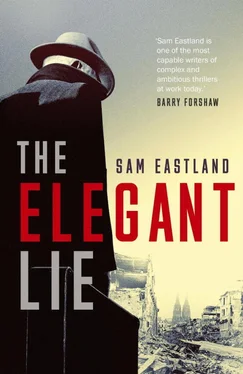‘I don’t need your respect,’ said Carter. ‘I just need you to keep me alive.’
‘Then you can start by trusting me, because I’m one of the only people on this earth who knows you aren’t actually a criminal. And I’m the only one who can give you back your life◦– which I will, just as I promised, as long as you hold up your end of the bargain.’
‘It was never a bargain. It was blackmail.’
‘Call it whatever you want.’ As Wilby spoke, he lifted the metal dome of the food tray he had brought, revealing a half-eaten meal that he had picked up outside the room of another guest on his way up the back stairs. He pinched a piece of roast potato between his thumb and index finger and popped it in his mouth. ‘Nice place you got here,’ he said. ‘You’d best enjoy it while you can.’ Then he slipped out into the hall and closed the door quietly behind him.
Carter listened to the creak of Wilby’s footsteps fading away down the carpeted hallway. Then he lay back down, exhausted but unable to sleep. After a few minutes, he climbed off the bed, stretched out on the floor and closed his eyes.
The final thought to pass through his head before unconsciousness washed over him was how he could not have predicted, never in a million years, that his life would have turned out like this.
It was Carter’s own father, the chief of police in Dunellen, who recruited him straight out of college for a career in undercover work.
The year was 1937. With the Great Depression still in full swing, New Jersey was locked in a crime wave, much of it focused on the docklands of Newark and Elizabeth, just across the Hudson River from New York. The police were sorely in need of intelligence from inside and, after completing his basic training at the police academy, Carter was given the task of infiltrating the small, close-knit bands of thieves among the longshoremen.
He spent the next four years working as a stevedore along the docks, loading and unloading cargo from ships. Despite his police training, most of what he learned about undercover work could not be taught, even if there had been someone to teach him. Since the crew rosters were constantly being reshuffled, Carter found it easy to move among the longshoremen without drawing attention to himself, constantly aware that even the slightest mistake could get him killed. To keep his cover intact, he rented out three apartments, none within a mile of each other and each one under a different name. He kept no bank account, always insisting that he be paid in cash. He made no friends, but made sure he was known to everyone. Since much of what he learned came from hanging out at the longshoremen’s bars after work, he mastered the art of heavy drinking, or at least pretending to. Often, he would pick up half-empty glasses of beer when he had just ordered a fresh one, knowing that the owners of those half-empty glasses would gladly take his full glass without pointing out the mistake.
Carter became so adept at maintaining his forged identity that when, after a series of raids in which dozens of longshoremen were arrested, and rumours began to circulate that a police informant had penetrated the ranks of those who supplemented their income by stealing cargo off incoming ships, Carter was approached by his shift boss, a man named Alphonse Labrija. Labrija, whose work details were responsible for the majority of thefts at one of the largest docks in Elizabeth, entrusted Carter with the task of finding the undercover agent.
Now effectively in search of himself, Carter confronted another member of Labrija’s work detail, a twitchy, pinch-faced man named Harvey Kirsh, whom he knew had been stealing cargo in addition to that which had been sanctioned by Labrija. The punishment for these unauthorised thefts, devised by Labrija himself, was to have all five fingers of the man’s right hand severed at the middle joint. It could be made to look like an industrial accident and that was how it would be reported, even by the man who had witnessed his own fingers being removed with a meat cleaver, because reporting the matter to the police would only have resulted in the loss of more critical body parts. Carter had no difficulty persuading Kirsh to disappear and, under the pretext of some imagined solidarity, even provided him with the bus fare out of town.
As soon as Kirsh was gone, Carter informed Labrija that Kirsh had been the informant all along. Since Kirsh had vanished without any other apparent reason, Labrija readily accepted Carter’s story. Two months later, Labrija was arrested in a raid, along with most of his men, and was still blaming Kirsh for his misfortune when he began his ten-year sentence behind bars.
The River Gangs, as they were called, had initially made no distinction about what they stole. Often, they robbed crates without even knowing their contents. A profit could be turned from almost anything, and the River Gangs had many contacts in the areas around New York, New Jersey and Connecticut, where stolen items could be funnelled into the marketplace and sold, sometimes without any knowledge of the fact that they had been robbed, to the same shops where the goods would have been bought anyway.
But when war broke out in Europe in the autumn of 1939, the River Gangs turned increasingly to the theft of fuel. The reason for this was not only that the profit margin for selling fuel far outstripped the margins that could be earned from anything else coming off the ships in Elizabeth seaport, but also that most companies had switched from making products for the civilian marketplace to the production of wartime equipment, whether it was clothing, shoes or canned C-rations. Whereas there had always been a market for civilian goods, as well as a multitude of places where such items could be sold, military gear was issued as a matter of course, and only had to be paid for if it was lost.
But everybody needed fuel, and almost everybody wanted more than they were getting from the government. Attempts to colour fuel that had been designated for military use largely failed because military gasoline was sometimes issued legally to civilians when undyed fuel could not be found to meet the ration quotas.
The theft of gasoline and diesel became so pervasive that people who would never normally have considered buying stolen goods now did precisely that, since it had largely lost the stigma of criminality. People knew it was wrong, but it seemed like everybody was doing it, so it became easier to blame the government for over-zealous rationing restrictions than to admit that they were committing a crime.
Even before the attack on Pearl Harbor in December 1941 and the total mobilisation of the American war machine, the US military was losing twenty thousand gallons a day, 10 per cent of its total intake, to thefts ranging from a couple of gallons to entire tanker trucks which disappeared without trace.
From Carter’s vantage point, the problem had grown far bigger than anything people in his line of work could handle.
Although he didn’t know it at the time, the government had arrived at the same conclusion.
In October 1942, Carter received an order to appear at his precinct headquarters, an imposing stone structure called the Marquette Building, which took up half a block on Arcade Street in downtown Elizabeth. Although Carter had entered the building several times during his early days as a recruit, once he became an undercover detective he rarely went near the place. Even to be seen in the vicinity of the Marquette Building by a member of the River Gangs might be enough to blow his cover.
The order came with no explanation, only a date, a time and a room number. The only thing Carter could think of as to why he had been summoned in this way was that he had made some kind of mistake, for which he would now be facing an official reprimand and perhaps even suspension. In the days leading up to his appearance, Carter racked his brain for what he might have done wrong. His father, to whom he might have turned for information, had retired owing to ill health some years before and now rarely left his little clapboard house in Belmar, out on the Jersey shore. So there was no point in bothering him.
Читать дальше











